FC300 Extended Project: Analyzing Fast Fashion & Sweatshops Report
VerifiedAdded on 2023/06/10
|20
|5167
|487
Report
AI Summary
This report outline delves into the complex relationship between fast fashion, sweatshops, and developing countries, particularly focusing on the situation in Turkey. It examines the rise of the fast fashion industry and its impact on vulnerable populations, including migrants and refugees, who are often subjected to exploitative labor practices. The report aims to analyze the factors contributing to the growth of sweatshops, the working conditions faced by laborers, and the role of patriarchal social constructs in the exploitation of women in the industry. It also explores the dynamics of small-scale competition and poverty that both contribute to and are worsened by the industry's growth. The report draws upon various sources to provide a comprehensive understanding of the issues, highlighting the need for increased regulation, sustainability, and ethical practices in the fast fashion sector.
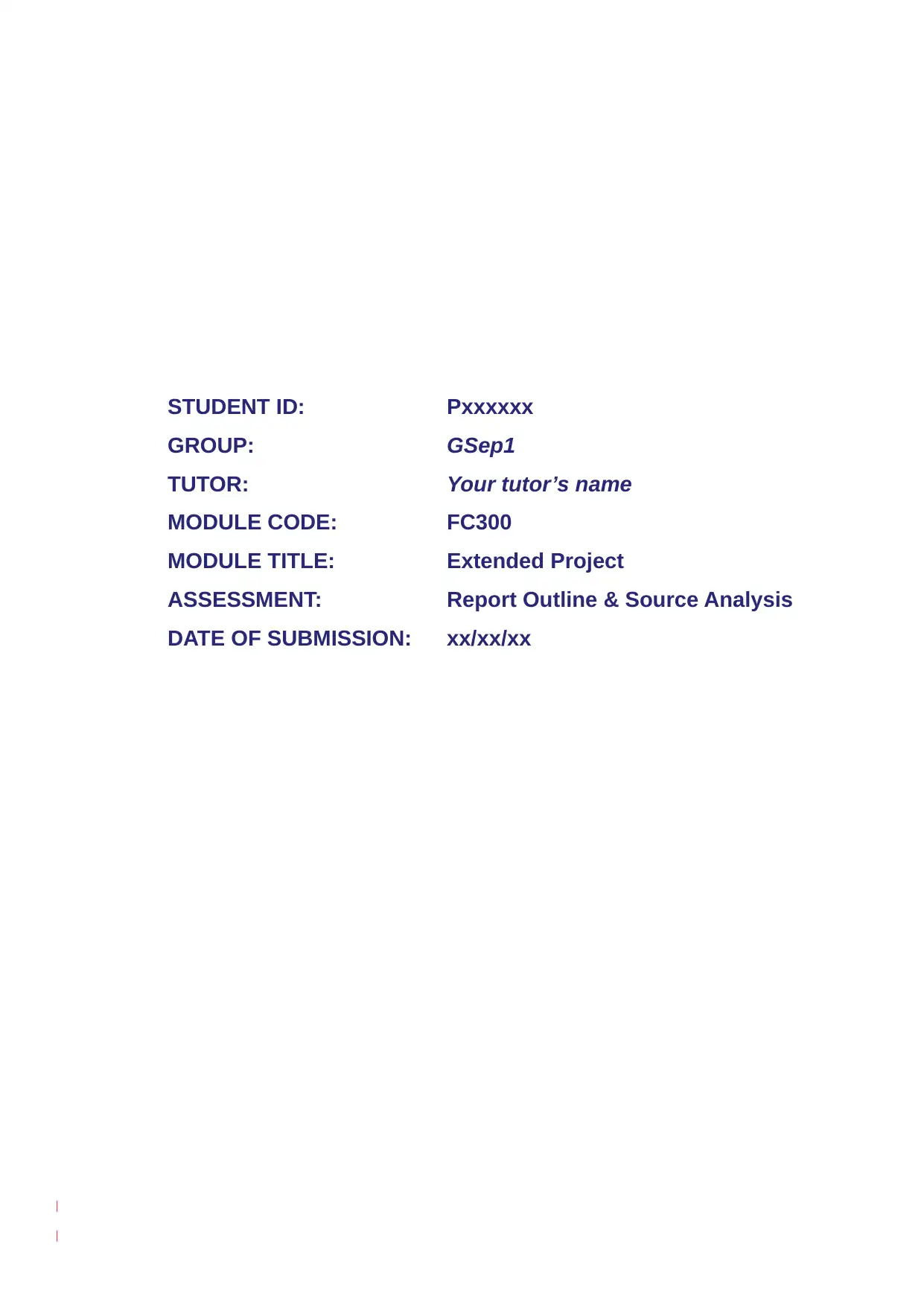
STUDENT ID: Pxxxxxx
GROUP: GSep1
TUTOR: Your tutor’s name
MODULE CODE: FC300
MODULE TITLE: Extended Project
ASSESSMENT: Report Outline & Source Analysis
DATE OF SUBMISSION: xx/xx/xx
| 1
|
GROUP: GSep1
TUTOR: Your tutor’s name
MODULE CODE: FC300
MODULE TITLE: Extended Project
ASSESSMENT: Report Outline & Source Analysis
DATE OF SUBMISSION: xx/xx/xx
| 1
|
Paraphrase This Document
Need a fresh take? Get an instant paraphrase of this document with our AI Paraphraser
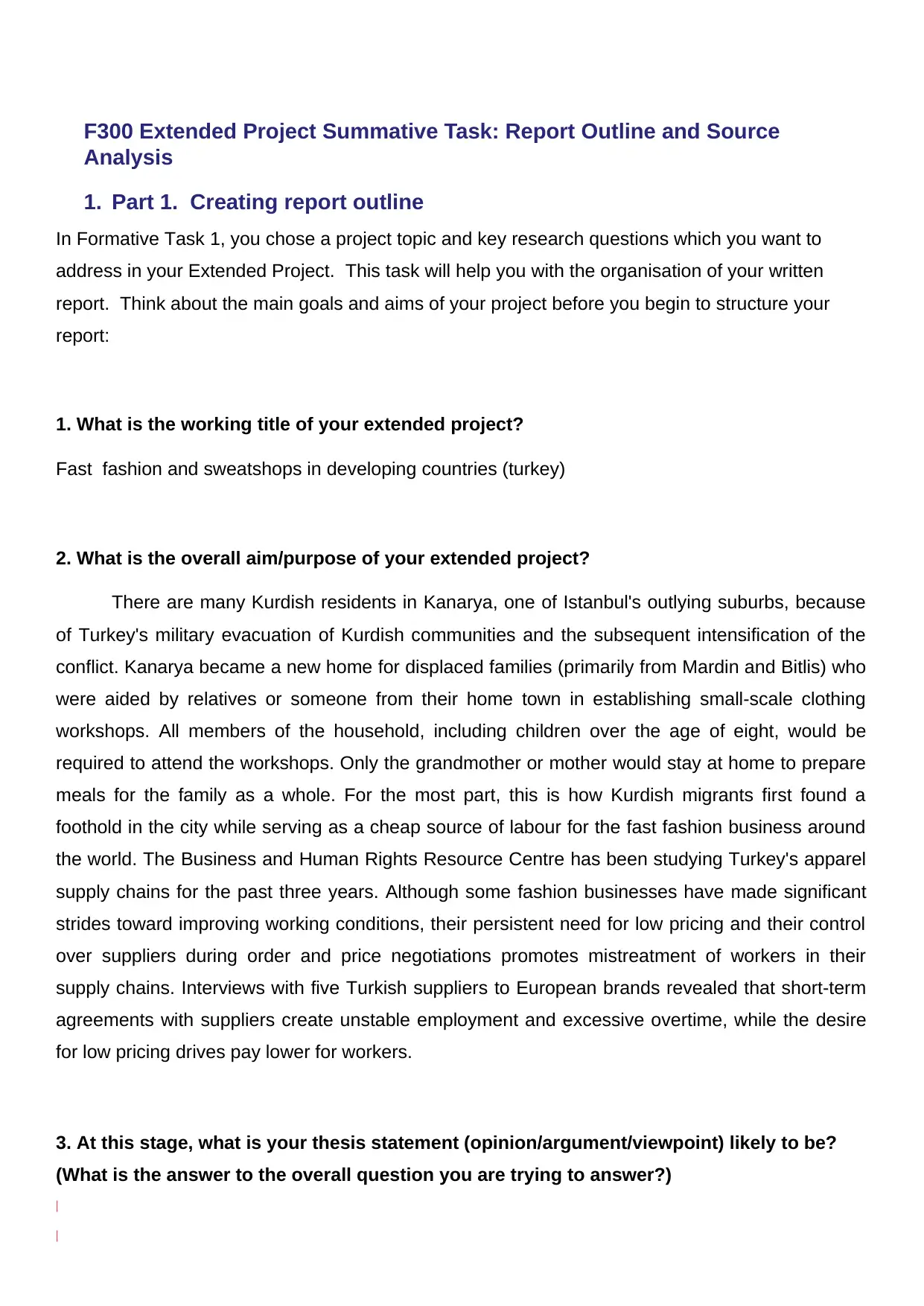
F300 Extended Project Summative Task: Report Outline and Source
Analysis
1. Part 1. Creating report outline
In Formative Task 1, you chose a project topic and key research questions which you want to
address in your Extended Project. This task will help you with the organisation of your written
report. Think about the main goals and aims of your project before you begin to structure your
report:
1. What is the working title of your extended project?
Fast fashion and sweatshops in developing countries (turkey)
2. What is the overall aim/purpose of your extended project?
There are many Kurdish residents in Kanarya, one of Istanbul's outlying suburbs, because
of Turkey's military evacuation of Kurdish communities and the subsequent intensification of the
conflict. Kanarya became a new home for displaced families (primarily from Mardin and Bitlis) who
were aided by relatives or someone from their home town in establishing small-scale clothing
workshops. All members of the household, including children over the age of eight, would be
required to attend the workshops. Only the grandmother or mother would stay at home to prepare
meals for the family as a whole. For the most part, this is how Kurdish migrants first found a
foothold in the city while serving as a cheap source of labour for the fast fashion business around
the world. The Business and Human Rights Resource Centre has been studying Turkey's apparel
supply chains for the past three years. Although some fashion businesses have made significant
strides toward improving working conditions, their persistent need for low pricing and their control
over suppliers during order and price negotiations promotes mistreatment of workers in their
supply chains. Interviews with five Turkish suppliers to European brands revealed that short-term
agreements with suppliers create unstable employment and excessive overtime, while the desire
for low pricing drives pay lower for workers.
3. At this stage, what is your thesis statement (opinion/argument/viewpoint) likely to be?
(What is the answer to the overall question you are trying to answer?)
| 2
|
Analysis
1. Part 1. Creating report outline
In Formative Task 1, you chose a project topic and key research questions which you want to
address in your Extended Project. This task will help you with the organisation of your written
report. Think about the main goals and aims of your project before you begin to structure your
report:
1. What is the working title of your extended project?
Fast fashion and sweatshops in developing countries (turkey)
2. What is the overall aim/purpose of your extended project?
There are many Kurdish residents in Kanarya, one of Istanbul's outlying suburbs, because
of Turkey's military evacuation of Kurdish communities and the subsequent intensification of the
conflict. Kanarya became a new home for displaced families (primarily from Mardin and Bitlis) who
were aided by relatives or someone from their home town in establishing small-scale clothing
workshops. All members of the household, including children over the age of eight, would be
required to attend the workshops. Only the grandmother or mother would stay at home to prepare
meals for the family as a whole. For the most part, this is how Kurdish migrants first found a
foothold in the city while serving as a cheap source of labour for the fast fashion business around
the world. The Business and Human Rights Resource Centre has been studying Turkey's apparel
supply chains for the past three years. Although some fashion businesses have made significant
strides toward improving working conditions, their persistent need for low pricing and their control
over suppliers during order and price negotiations promotes mistreatment of workers in their
supply chains. Interviews with five Turkish suppliers to European brands revealed that short-term
agreements with suppliers create unstable employment and excessive overtime, while the desire
for low pricing drives pay lower for workers.
3. At this stage, what is your thesis statement (opinion/argument/viewpoint) likely to be?
(What is the answer to the overall question you are trying to answer?)
| 2
|
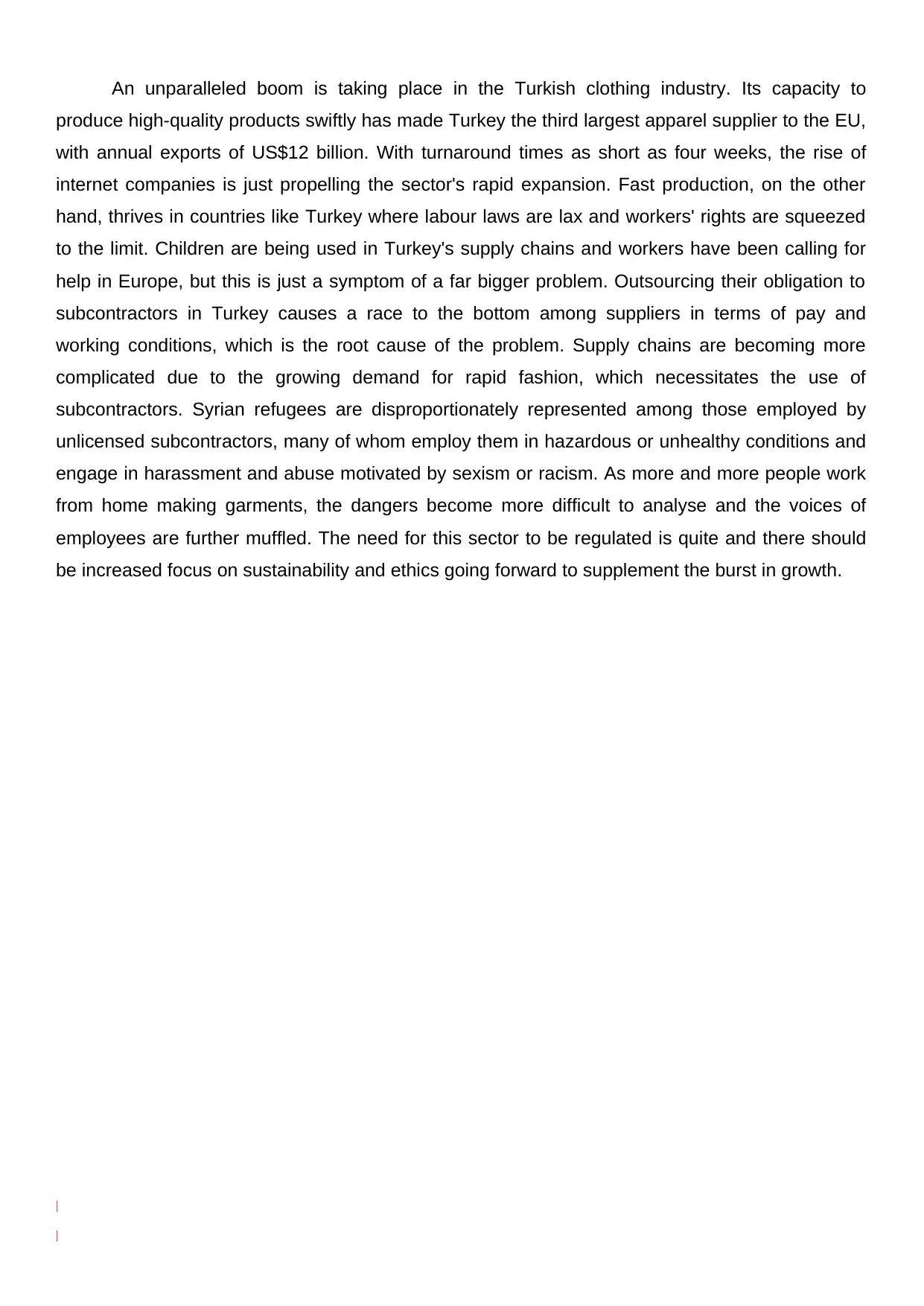
An unparalleled boom is taking place in the Turkish clothing industry. Its capacity to
produce high-quality products swiftly has made Turkey the third largest apparel supplier to the EU,
with annual exports of US$12 billion. With turnaround times as short as four weeks, the rise of
internet companies is just propelling the sector's rapid expansion. Fast production, on the other
hand, thrives in countries like Turkey where labour laws are lax and workers' rights are squeezed
to the limit. Children are being used in Turkey's supply chains and workers have been calling for
help in Europe, but this is just a symptom of a far bigger problem. Outsourcing their obligation to
subcontractors in Turkey causes a race to the bottom among suppliers in terms of pay and
working conditions, which is the root cause of the problem. Supply chains are becoming more
complicated due to the growing demand for rapid fashion, which necessitates the use of
subcontractors. Syrian refugees are disproportionately represented among those employed by
unlicensed subcontractors, many of whom employ them in hazardous or unhealthy conditions and
engage in harassment and abuse motivated by sexism or racism. As more and more people work
from home making garments, the dangers become more difficult to analyse and the voices of
employees are further muffled. The need for this sector to be regulated is quite and there should
be increased focus on sustainability and ethics going forward to supplement the burst in growth.
| 3
|
produce high-quality products swiftly has made Turkey the third largest apparel supplier to the EU,
with annual exports of US$12 billion. With turnaround times as short as four weeks, the rise of
internet companies is just propelling the sector's rapid expansion. Fast production, on the other
hand, thrives in countries like Turkey where labour laws are lax and workers' rights are squeezed
to the limit. Children are being used in Turkey's supply chains and workers have been calling for
help in Europe, but this is just a symptom of a far bigger problem. Outsourcing their obligation to
subcontractors in Turkey causes a race to the bottom among suppliers in terms of pay and
working conditions, which is the root cause of the problem. Supply chains are becoming more
complicated due to the growing demand for rapid fashion, which necessitates the use of
subcontractors. Syrian refugees are disproportionately represented among those employed by
unlicensed subcontractors, many of whom employ them in hazardous or unhealthy conditions and
engage in harassment and abuse motivated by sexism or racism. As more and more people work
from home making garments, the dangers become more difficult to analyse and the voices of
employees are further muffled. The need for this sector to be regulated is quite and there should
be increased focus on sustainability and ethics going forward to supplement the burst in growth.
| 3
|
⊘ This is a preview!⊘
Do you want full access?
Subscribe today to unlock all pages.

Trusted by 1+ million students worldwide
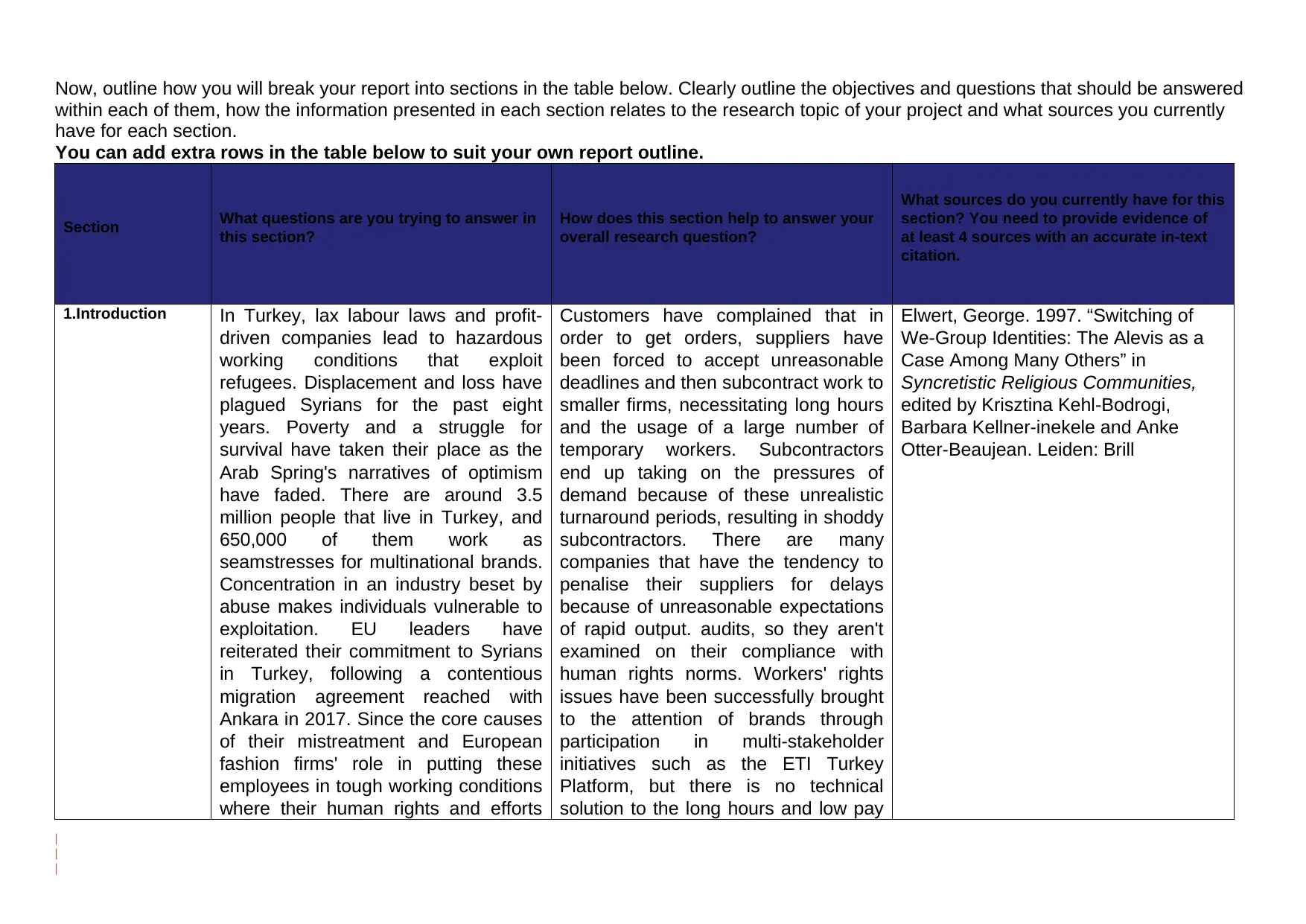
Now, outline how you will break your report into sections in the table below. Clearly outline the objectives and questions that should be answered
within each of them, how the information presented in each section relates to the research topic of your project and what sources you currently
have for each section.
You can add extra rows in the table below to suit your own report outline.
Section What questions are you trying to answer in
this section?
How does this section help to answer your
overall research question?
What sources do you currently have for this
section? You need to provide evidence of
at least 4 sources with an accurate in-text
citation.
1.Introduction In Turkey, lax labour laws and profit-
driven companies lead to hazardous
working conditions that exploit
refugees. Displacement and loss have
plagued Syrians for the past eight
years. Poverty and a struggle for
survival have taken their place as the
Arab Spring's narratives of optimism
have faded. There are around 3.5
million people that live in Turkey, and
650,000 of them work as
seamstresses for multinational brands.
Concentration in an industry beset by
abuse makes individuals vulnerable to
exploitation. EU leaders have
reiterated their commitment to Syrians
in Turkey, following a contentious
migration agreement reached with
Ankara in 2017. Since the core causes
of their mistreatment and European
fashion firms' role in putting these
employees in tough working conditions
where their human rights and efforts
Customers have complained that in
order to get orders, suppliers have
been forced to accept unreasonable
deadlines and then subcontract work to
smaller firms, necessitating long hours
and the usage of a large number of
temporary workers. Subcontractors
end up taking on the pressures of
demand because of these unrealistic
turnaround periods, resulting in shoddy
subcontractors. There are many
companies that have the tendency to
penalise their suppliers for delays
because of unreasonable expectations
of rapid output. audits, so they aren't
examined on their compliance with
human rights norms. Workers' rights
issues have been successfully brought
to the attention of brands through
participation in multi-stakeholder
initiatives such as the ETI Turkey
Platform, but there is no technical
solution to the long hours and low pay
Elwert, George. 1997. “Switching of
We-Group Identities: The Alevis as a
Case Among Many Others” in
Syncretistic Religious Communities,
edited by Krisztina Kehl-Bodrogi,
Barbara Kellner-inekele and Anke
Otter-Beaujean. Leiden: Brill
|
| 4
|
within each of them, how the information presented in each section relates to the research topic of your project and what sources you currently
have for each section.
You can add extra rows in the table below to suit your own report outline.
Section What questions are you trying to answer in
this section?
How does this section help to answer your
overall research question?
What sources do you currently have for this
section? You need to provide evidence of
at least 4 sources with an accurate in-text
citation.
1.Introduction In Turkey, lax labour laws and profit-
driven companies lead to hazardous
working conditions that exploit
refugees. Displacement and loss have
plagued Syrians for the past eight
years. Poverty and a struggle for
survival have taken their place as the
Arab Spring's narratives of optimism
have faded. There are around 3.5
million people that live in Turkey, and
650,000 of them work as
seamstresses for multinational brands.
Concentration in an industry beset by
abuse makes individuals vulnerable to
exploitation. EU leaders have
reiterated their commitment to Syrians
in Turkey, following a contentious
migration agreement reached with
Ankara in 2017. Since the core causes
of their mistreatment and European
fashion firms' role in putting these
employees in tough working conditions
where their human rights and efforts
Customers have complained that in
order to get orders, suppliers have
been forced to accept unreasonable
deadlines and then subcontract work to
smaller firms, necessitating long hours
and the usage of a large number of
temporary workers. Subcontractors
end up taking on the pressures of
demand because of these unrealistic
turnaround periods, resulting in shoddy
subcontractors. There are many
companies that have the tendency to
penalise their suppliers for delays
because of unreasonable expectations
of rapid output. audits, so they aren't
examined on their compliance with
human rights norms. Workers' rights
issues have been successfully brought
to the attention of brands through
participation in multi-stakeholder
initiatives such as the ETI Turkey
Platform, but there is no technical
solution to the long hours and low pay
Elwert, George. 1997. “Switching of
We-Group Identities: The Alevis as a
Case Among Many Others” in
Syncretistic Religious Communities,
edited by Krisztina Kehl-Bodrogi,
Barbara Kellner-inekele and Anke
Otter-Beaujean. Leiden: Brill
|
| 4
|
Paraphrase This Document
Need a fresh take? Get an instant paraphrase of this document with our AI Paraphraser
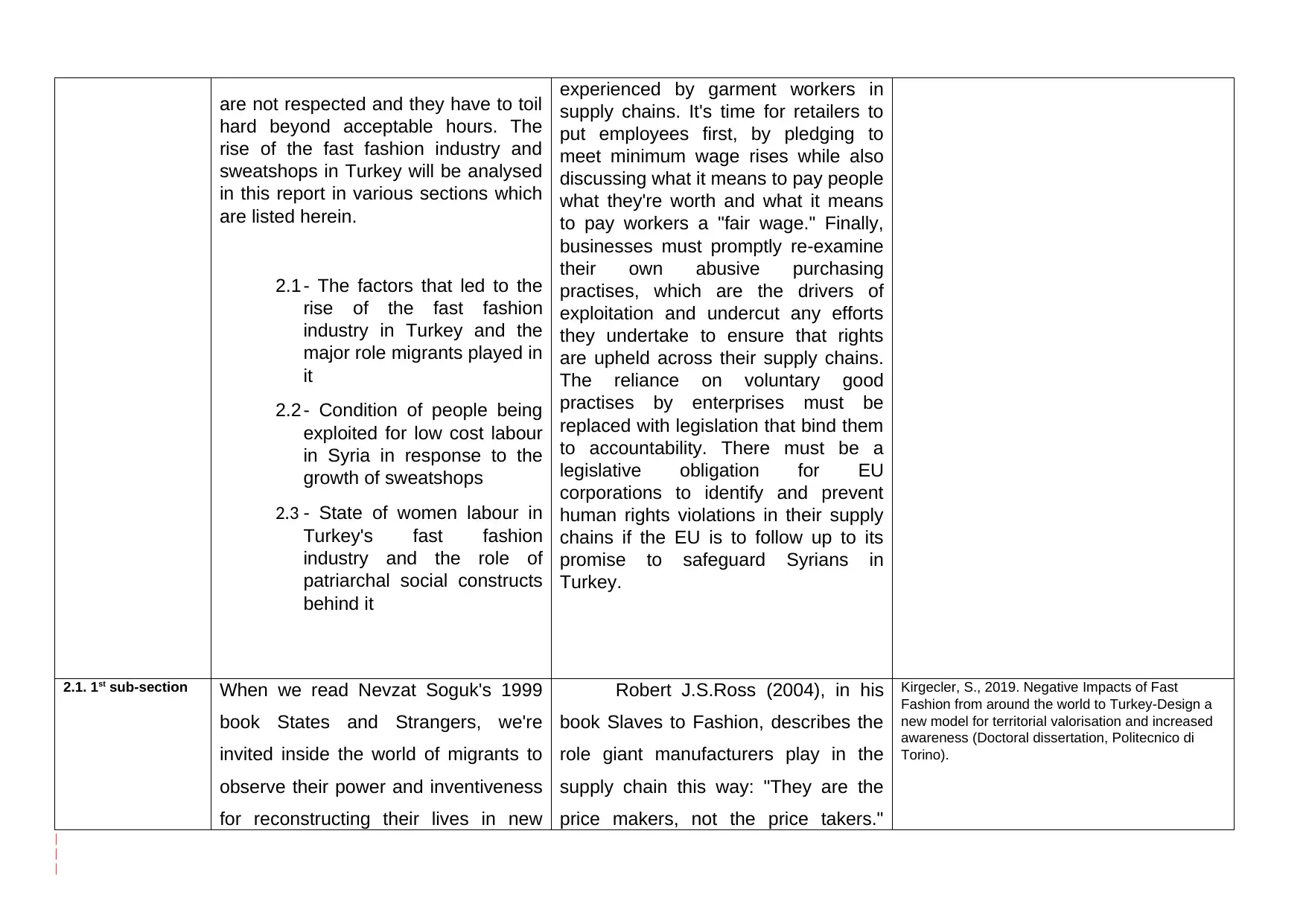
are not respected and they have to toil
hard beyond acceptable hours. The
rise of the fast fashion industry and
sweatshops in Turkey will be analysed
in this report in various sections which
are listed herein.
2.1 - The factors that led to the
rise of the fast fashion
industry in Turkey and the
major role migrants played in
it
2.2 - Condition of people being
exploited for low cost labour
in Syria in response to the
growth of sweatshops
2.3 - State of women labour in
Turkey's fast fashion
industry and the role of
patriarchal social constructs
behind it
experienced by garment workers in
supply chains. It's time for retailers to
put employees first, by pledging to
meet minimum wage rises while also
discussing what it means to pay people
what they're worth and what it means
to pay workers a "fair wage." Finally,
businesses must promptly re-examine
their own abusive purchasing
practises, which are the drivers of
exploitation and undercut any efforts
they undertake to ensure that rights
are upheld across their supply chains.
The reliance on voluntary good
practises by enterprises must be
replaced with legislation that bind them
to accountability. There must be a
legislative obligation for EU
corporations to identify and prevent
human rights violations in their supply
chains if the EU is to follow up to its
promise to safeguard Syrians in
Turkey.
2.1. 1st sub-section When we read Nevzat Soguk's 1999
book States and Strangers, we're
invited inside the world of migrants to
observe their power and inventiveness
for reconstructing their lives in new
Robert J.S.Ross (2004), in his
book Slaves to Fashion, describes the
role giant manufacturers play in the
supply chain this way: "They are the
price makers, not the price takers."
Kirgecler, S., 2019. Negative Impacts of Fast
Fashion from around the world to Turkey-Design a
new model for territorial valorisation and increased
awareness (Doctoral dissertation, Politecnico di
Torino).
|
| 5
|
hard beyond acceptable hours. The
rise of the fast fashion industry and
sweatshops in Turkey will be analysed
in this report in various sections which
are listed herein.
2.1 - The factors that led to the
rise of the fast fashion
industry in Turkey and the
major role migrants played in
it
2.2 - Condition of people being
exploited for low cost labour
in Syria in response to the
growth of sweatshops
2.3 - State of women labour in
Turkey's fast fashion
industry and the role of
patriarchal social constructs
behind it
experienced by garment workers in
supply chains. It's time for retailers to
put employees first, by pledging to
meet minimum wage rises while also
discussing what it means to pay people
what they're worth and what it means
to pay workers a "fair wage." Finally,
businesses must promptly re-examine
their own abusive purchasing
practises, which are the drivers of
exploitation and undercut any efforts
they undertake to ensure that rights
are upheld across their supply chains.
The reliance on voluntary good
practises by enterprises must be
replaced with legislation that bind them
to accountability. There must be a
legislative obligation for EU
corporations to identify and prevent
human rights violations in their supply
chains if the EU is to follow up to its
promise to safeguard Syrians in
Turkey.
2.1. 1st sub-section When we read Nevzat Soguk's 1999
book States and Strangers, we're
invited inside the world of migrants to
observe their power and inventiveness
for reconstructing their lives in new
Robert J.S.Ross (2004), in his
book Slaves to Fashion, describes the
role giant manufacturers play in the
supply chain this way: "They are the
price makers, not the price takers."
Kirgecler, S., 2019. Negative Impacts of Fast
Fashion from around the world to Turkey-Design a
new model for territorial valorisation and increased
awareness (Doctoral dissertation, Politecnico di
Torino).
|
| 5
|
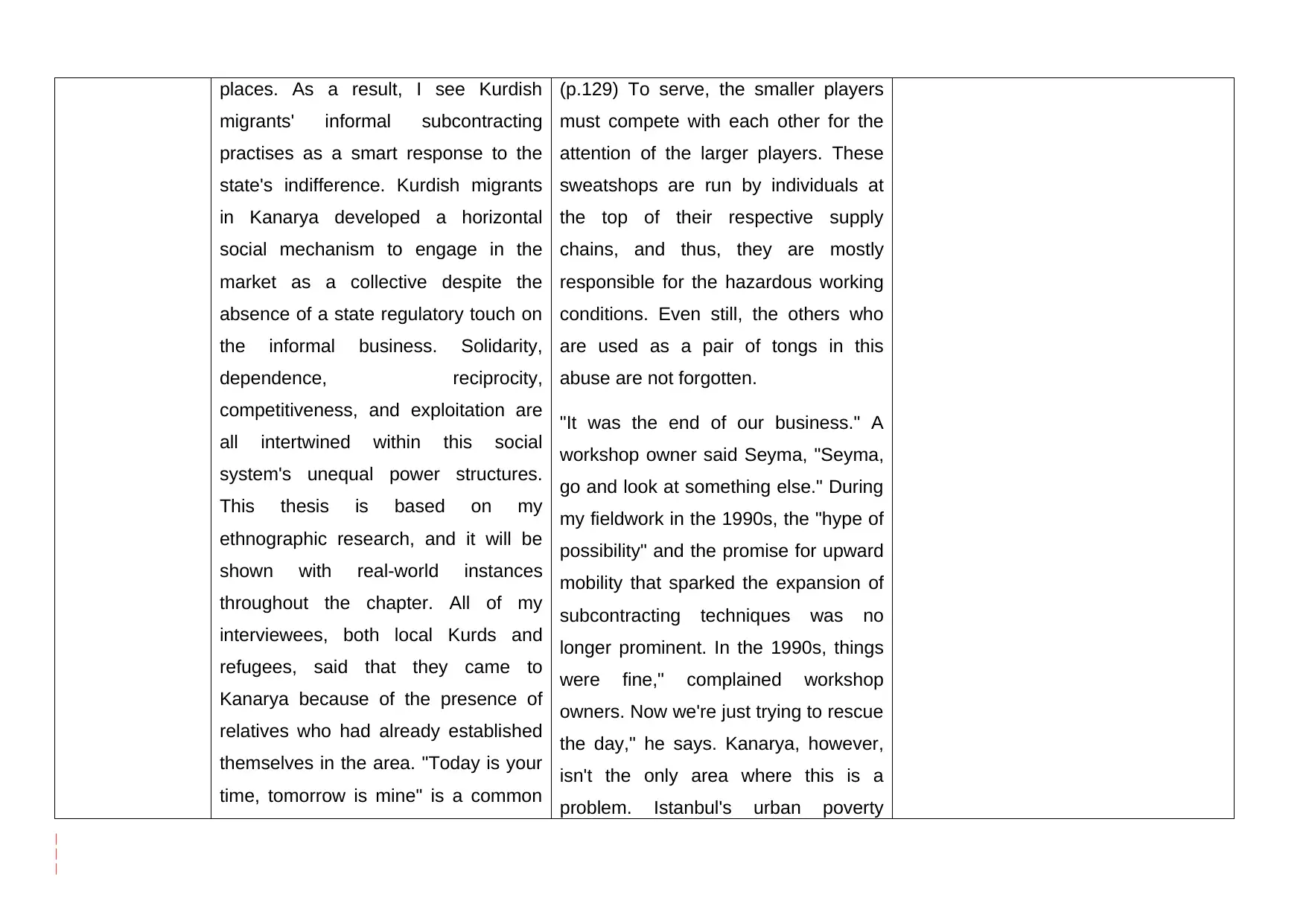
places. As a result, I see Kurdish
migrants' informal subcontracting
practises as a smart response to the
state's indifference. Kurdish migrants
in Kanarya developed a horizontal
social mechanism to engage in the
market as a collective despite the
absence of a state regulatory touch on
the informal business. Solidarity,
dependence, reciprocity,
competitiveness, and exploitation are
all intertwined within this social
system's unequal power structures.
This thesis is based on my
ethnographic research, and it will be
shown with real-world instances
throughout the chapter. All of my
interviewees, both local Kurds and
refugees, said that they came to
Kanarya because of the presence of
relatives who had already established
themselves in the area. "Today is your
time, tomorrow is mine" is a common
(p.129) To serve, the smaller players
must compete with each other for the
attention of the larger players. These
sweatshops are run by individuals at
the top of their respective supply
chains, and thus, they are mostly
responsible for the hazardous working
conditions. Even still, the others who
are used as a pair of tongs in this
abuse are not forgotten.
"It was the end of our business." A
workshop owner said Seyma, "Seyma,
go and look at something else." During
my fieldwork in the 1990s, the "hype of
possibility" and the promise for upward
mobility that sparked the expansion of
subcontracting techniques was no
longer prominent. In the 1990s, things
were fine," complained workshop
owners. Now we're just trying to rescue
the day," he says. Kanarya, however,
isn't the only area where this is a
problem. Istanbul's urban poverty
|
| 6
|
migrants' informal subcontracting
practises as a smart response to the
state's indifference. Kurdish migrants
in Kanarya developed a horizontal
social mechanism to engage in the
market as a collective despite the
absence of a state regulatory touch on
the informal business. Solidarity,
dependence, reciprocity,
competitiveness, and exploitation are
all intertwined within this social
system's unequal power structures.
This thesis is based on my
ethnographic research, and it will be
shown with real-world instances
throughout the chapter. All of my
interviewees, both local Kurds and
refugees, said that they came to
Kanarya because of the presence of
relatives who had already established
themselves in the area. "Today is your
time, tomorrow is mine" is a common
(p.129) To serve, the smaller players
must compete with each other for the
attention of the larger players. These
sweatshops are run by individuals at
the top of their respective supply
chains, and thus, they are mostly
responsible for the hazardous working
conditions. Even still, the others who
are used as a pair of tongs in this
abuse are not forgotten.
"It was the end of our business." A
workshop owner said Seyma, "Seyma,
go and look at something else." During
my fieldwork in the 1990s, the "hype of
possibility" and the promise for upward
mobility that sparked the expansion of
subcontracting techniques was no
longer prominent. In the 1990s, things
were fine," complained workshop
owners. Now we're just trying to rescue
the day," he says. Kanarya, however,
isn't the only area where this is a
problem. Istanbul's urban poverty
|
| 6
|
⊘ This is a preview!⊘
Do you want full access?
Subscribe today to unlock all pages.

Trusted by 1+ million students worldwide
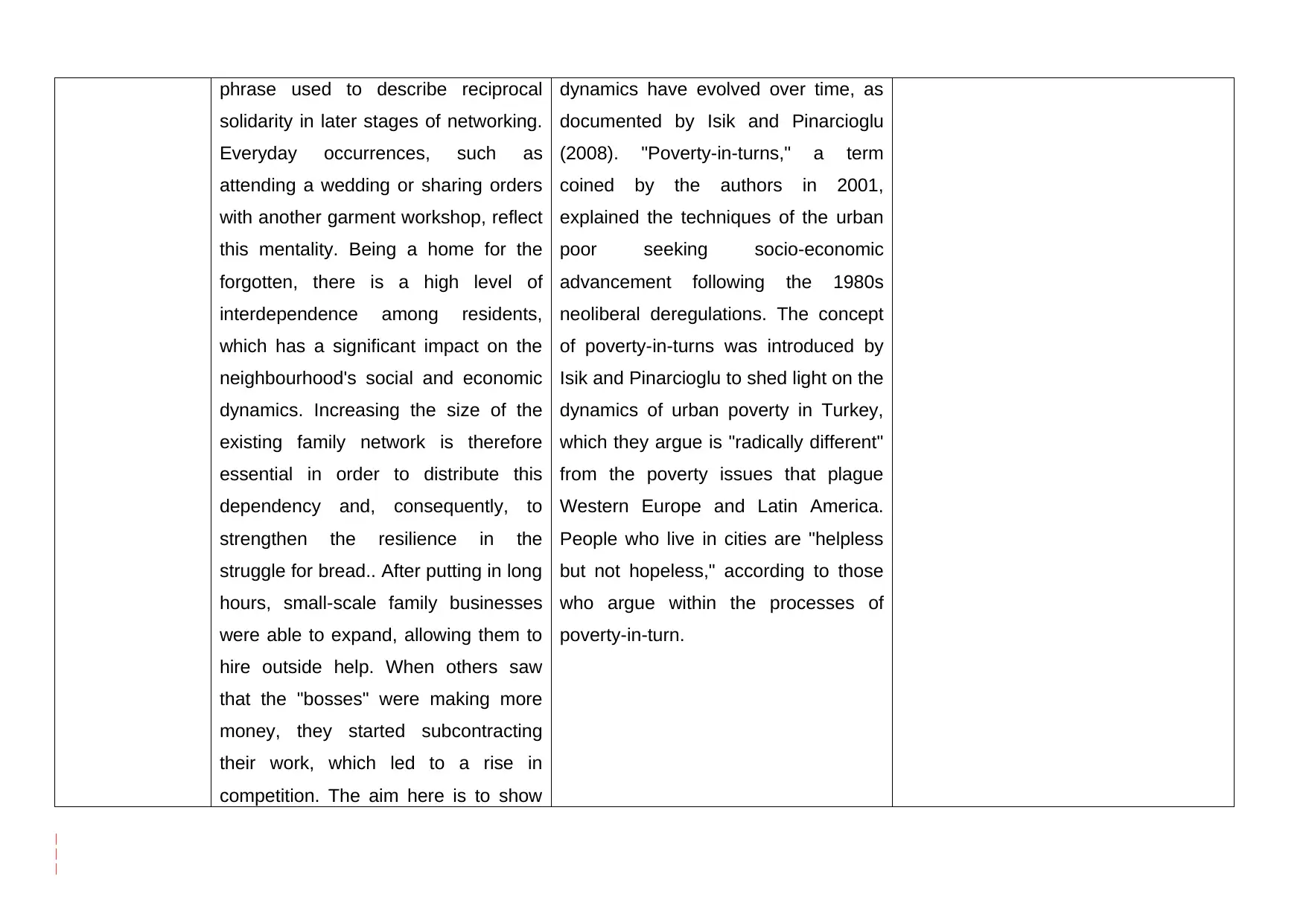
phrase used to describe reciprocal
solidarity in later stages of networking.
Everyday occurrences, such as
attending a wedding or sharing orders
with another garment workshop, reflect
this mentality. Being a home for the
forgotten, there is a high level of
interdependence among residents,
which has a significant impact on the
neighbourhood's social and economic
dynamics. Increasing the size of the
existing family network is therefore
essential in order to distribute this
dependency and, consequently, to
strengthen the resilience in the
struggle for bread.. After putting in long
hours, small-scale family businesses
were able to expand, allowing them to
hire outside help. When others saw
that the "bosses" were making more
money, they started subcontracting
their work, which led to a rise in
competition. The aim here is to show
dynamics have evolved over time, as
documented by Isik and Pinarcioglu
(2008). "Poverty-in-turns," a term
coined by the authors in 2001,
explained the techniques of the urban
poor seeking socio-economic
advancement following the 1980s
neoliberal deregulations. The concept
of poverty-in-turns was introduced by
Isik and Pinarcioglu to shed light on the
dynamics of urban poverty in Turkey,
which they argue is "radically different"
from the poverty issues that plague
Western Europe and Latin America.
People who live in cities are "helpless
but not hopeless," according to those
who argue within the processes of
poverty-in-turn.
|
| 7
|
solidarity in later stages of networking.
Everyday occurrences, such as
attending a wedding or sharing orders
with another garment workshop, reflect
this mentality. Being a home for the
forgotten, there is a high level of
interdependence among residents,
which has a significant impact on the
neighbourhood's social and economic
dynamics. Increasing the size of the
existing family network is therefore
essential in order to distribute this
dependency and, consequently, to
strengthen the resilience in the
struggle for bread.. After putting in long
hours, small-scale family businesses
were able to expand, allowing them to
hire outside help. When others saw
that the "bosses" were making more
money, they started subcontracting
their work, which led to a rise in
competition. The aim here is to show
dynamics have evolved over time, as
documented by Isik and Pinarcioglu
(2008). "Poverty-in-turns," a term
coined by the authors in 2001,
explained the techniques of the urban
poor seeking socio-economic
advancement following the 1980s
neoliberal deregulations. The concept
of poverty-in-turns was introduced by
Isik and Pinarcioglu to shed light on the
dynamics of urban poverty in Turkey,
which they argue is "radically different"
from the poverty issues that plague
Western Europe and Latin America.
People who live in cities are "helpless
but not hopeless," according to those
who argue within the processes of
poverty-in-turn.
|
| 7
|
Paraphrase This Document
Need a fresh take? Get an instant paraphrase of this document with our AI Paraphraser
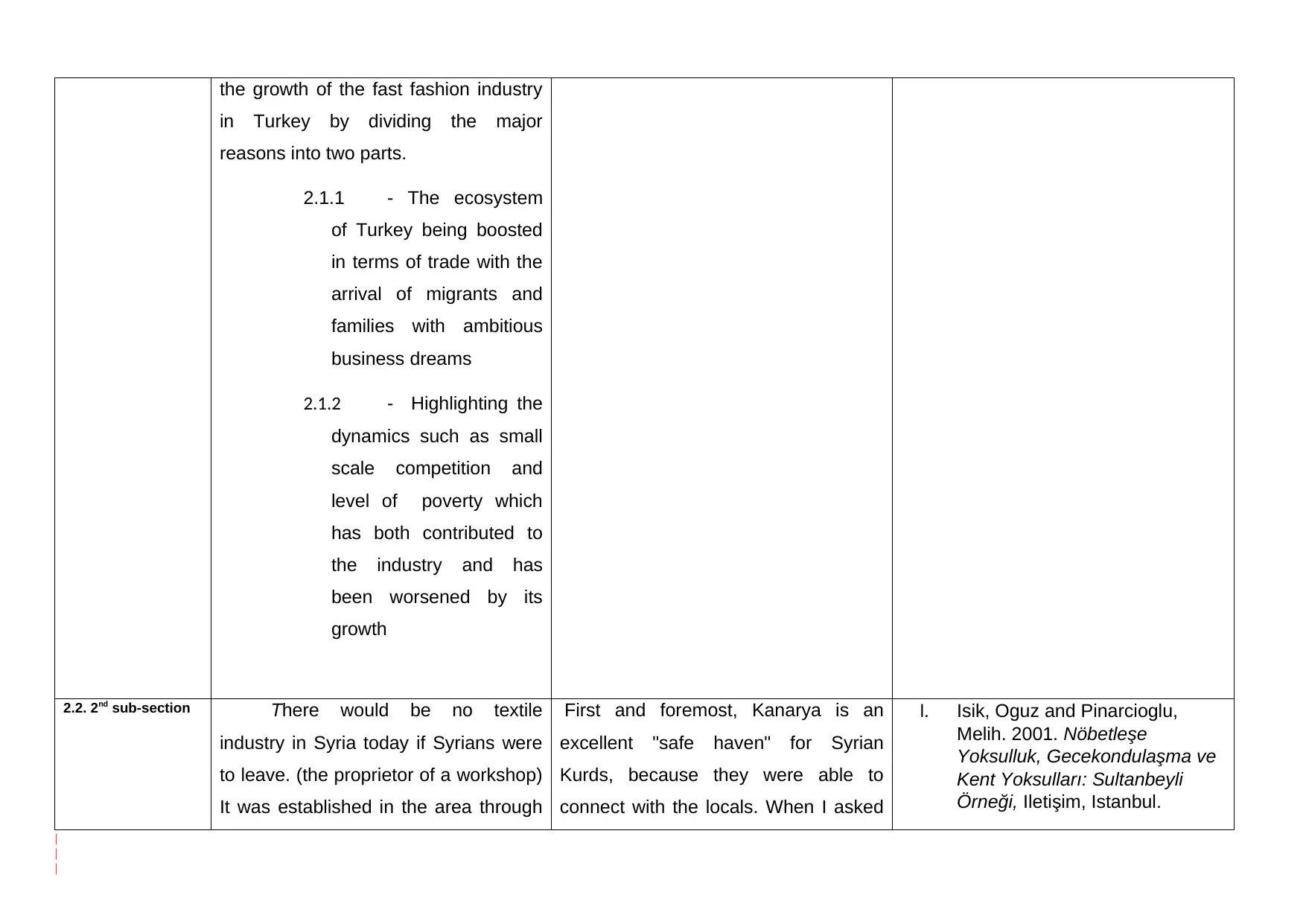
the growth of the fast fashion industry
in Turkey by dividing the major
reasons into two parts.
2.1.1 - The ecosystem
of Turkey being boosted
in terms of trade with the
arrival of migrants and
families with ambitious
business dreams
2.1.2 - Highlighting the
dynamics such as small
scale competition and
level of poverty which
has both contributed to
the industry and has
been worsened by its
growth
2.2. 2nd sub-section There would be no textile
industry in Syria today if Syrians were
to leave. (the proprietor of a workshop)
It was established in the area through
First and foremost, Kanarya is an
excellent "safe haven" for Syrian
Kurds, because they were able to
connect with the locals. When I asked
l. Isik, Oguz and Pinarcioglu,
Melih. 2001. Nöbetleşe
Yoksulluk, Gecekondulaşma ve
Kent Yoksulları: Sultanbeyli
Örneği, Iletişim, Istanbul.
|
| 8
|
in Turkey by dividing the major
reasons into two parts.
2.1.1 - The ecosystem
of Turkey being boosted
in terms of trade with the
arrival of migrants and
families with ambitious
business dreams
2.1.2 - Highlighting the
dynamics such as small
scale competition and
level of poverty which
has both contributed to
the industry and has
been worsened by its
growth
2.2. 2nd sub-section There would be no textile
industry in Syria today if Syrians were
to leave. (the proprietor of a workshop)
It was established in the area through
First and foremost, Kanarya is an
excellent "safe haven" for Syrian
Kurds, because they were able to
connect with the locals. When I asked
l. Isik, Oguz and Pinarcioglu,
Melih. 2001. Nöbetleşe
Yoksulluk, Gecekondulaşma ve
Kent Yoksulları: Sultanbeyli
Örneği, Iletişim, Istanbul.
|
| 8
|
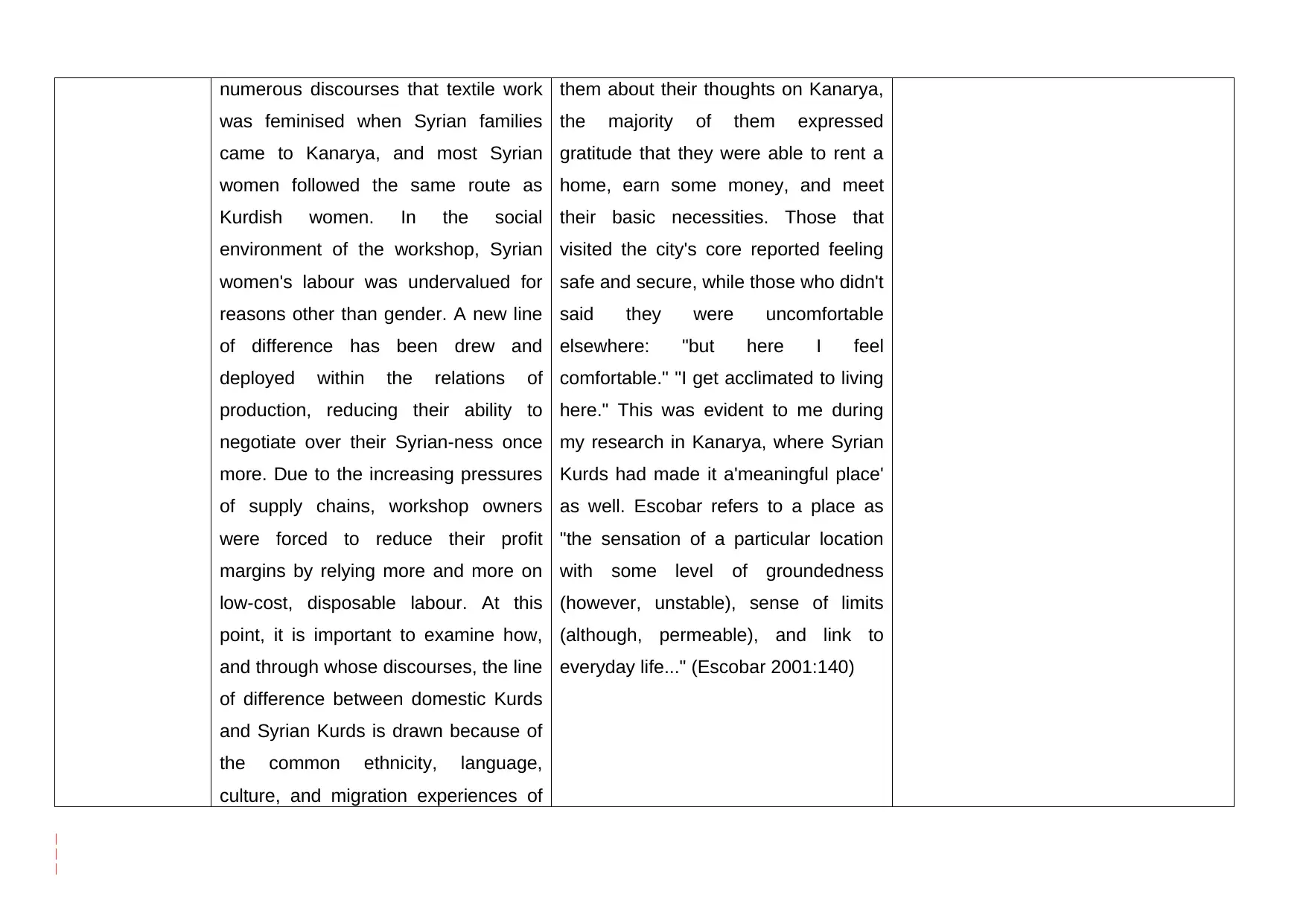
numerous discourses that textile work
was feminised when Syrian families
came to Kanarya, and most Syrian
women followed the same route as
Kurdish women. In the social
environment of the workshop, Syrian
women's labour was undervalued for
reasons other than gender. A new line
of difference has been drew and
deployed within the relations of
production, reducing their ability to
negotiate over their Syrian-ness once
more. Due to the increasing pressures
of supply chains, workshop owners
were forced to reduce their profit
margins by relying more and more on
low-cost, disposable labour. At this
point, it is important to examine how,
and through whose discourses, the line
of difference between domestic Kurds
and Syrian Kurds is drawn because of
the common ethnicity, language,
culture, and migration experiences of
them about their thoughts on Kanarya,
the majority of them expressed
gratitude that they were able to rent a
home, earn some money, and meet
their basic necessities. Those that
visited the city's core reported feeling
safe and secure, while those who didn't
said they were uncomfortable
elsewhere: "but here I feel
comfortable." "I get acclimated to living
here." This was evident to me during
my research in Kanarya, where Syrian
Kurds had made it a'meaningful place'
as well. Escobar refers to a place as
"the sensation of a particular location
with some level of groundedness
(however, unstable), sense of limits
(although, permeable), and link to
everyday life..." (Escobar 2001:140)
|
| 9
|
was feminised when Syrian families
came to Kanarya, and most Syrian
women followed the same route as
Kurdish women. In the social
environment of the workshop, Syrian
women's labour was undervalued for
reasons other than gender. A new line
of difference has been drew and
deployed within the relations of
production, reducing their ability to
negotiate over their Syrian-ness once
more. Due to the increasing pressures
of supply chains, workshop owners
were forced to reduce their profit
margins by relying more and more on
low-cost, disposable labour. At this
point, it is important to examine how,
and through whose discourses, the line
of difference between domestic Kurds
and Syrian Kurds is drawn because of
the common ethnicity, language,
culture, and migration experiences of
them about their thoughts on Kanarya,
the majority of them expressed
gratitude that they were able to rent a
home, earn some money, and meet
their basic necessities. Those that
visited the city's core reported feeling
safe and secure, while those who didn't
said they were uncomfortable
elsewhere: "but here I feel
comfortable." "I get acclimated to living
here." This was evident to me during
my research in Kanarya, where Syrian
Kurds had made it a'meaningful place'
as well. Escobar refers to a place as
"the sensation of a particular location
with some level of groundedness
(however, unstable), sense of limits
(although, permeable), and link to
everyday life..." (Escobar 2001:140)
|
| 9
|
⊘ This is a preview!⊘
Do you want full access?
Subscribe today to unlock all pages.

Trusted by 1+ million students worldwide
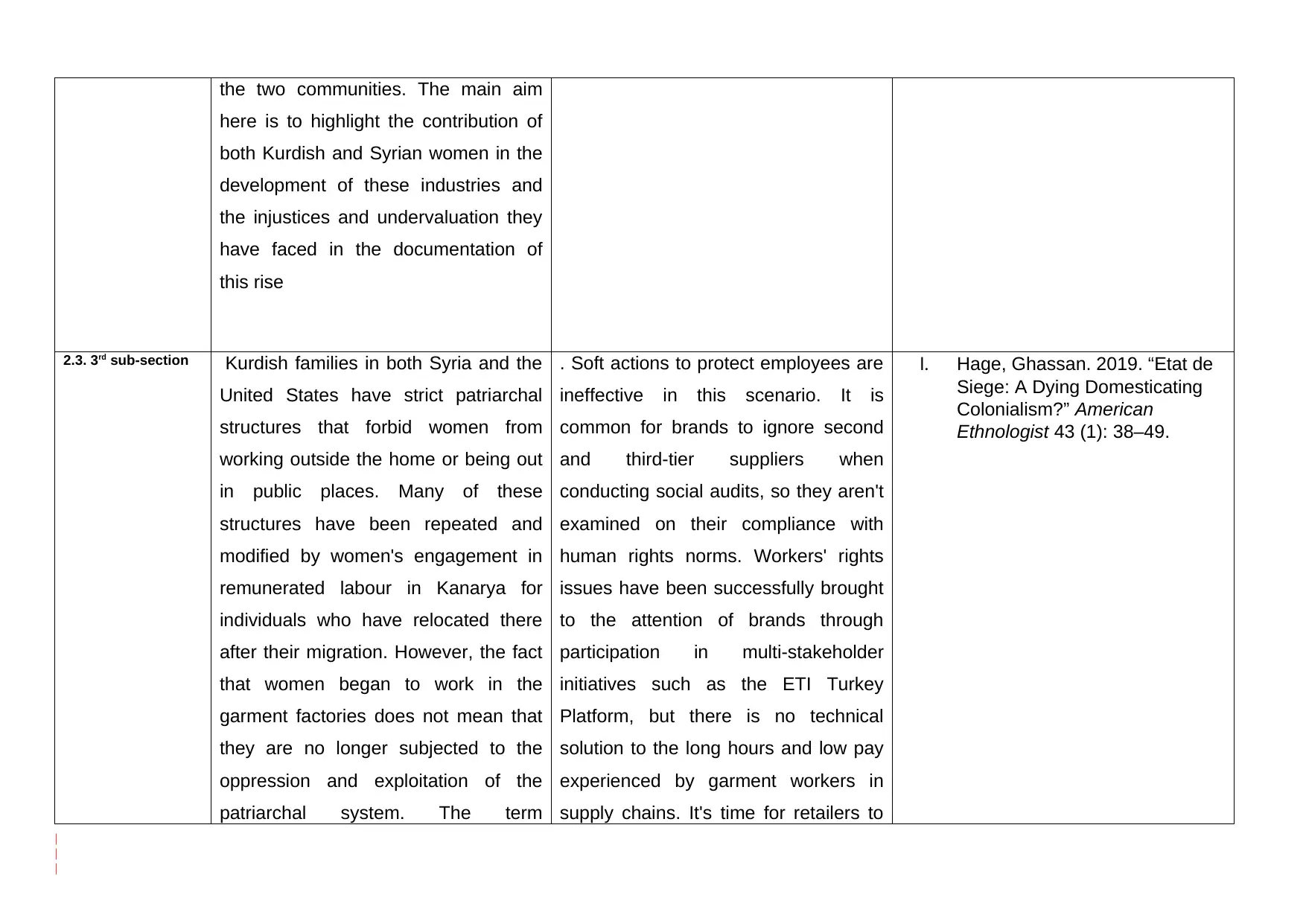
the two communities. The main aim
here is to highlight the contribution of
both Kurdish and Syrian women in the
development of these industries and
the injustices and undervaluation they
have faced in the documentation of
this rise
2.3. 3rd sub-section Kurdish families in both Syria and the
United States have strict patriarchal
structures that forbid women from
working outside the home or being out
in public places. Many of these
structures have been repeated and
modified by women's engagement in
remunerated labour in Kanarya for
individuals who have relocated there
after their migration. However, the fact
that women began to work in the
garment factories does not mean that
they are no longer subjected to the
oppression and exploitation of the
patriarchal system. The term
. Soft actions to protect employees are
ineffective in this scenario. It is
common for brands to ignore second
and third-tier suppliers when
conducting social audits, so they aren't
examined on their compliance with
human rights norms. Workers' rights
issues have been successfully brought
to the attention of brands through
participation in multi-stakeholder
initiatives such as the ETI Turkey
Platform, but there is no technical
solution to the long hours and low pay
experienced by garment workers in
supply chains. It's time for retailers to
l. Hage, Ghassan. 2019. “Etat de
Siege: A Dying Domesticating
Colonialism?” American
Ethnologist 43 (1): 38–49.
|
| 10
|
here is to highlight the contribution of
both Kurdish and Syrian women in the
development of these industries and
the injustices and undervaluation they
have faced in the documentation of
this rise
2.3. 3rd sub-section Kurdish families in both Syria and the
United States have strict patriarchal
structures that forbid women from
working outside the home or being out
in public places. Many of these
structures have been repeated and
modified by women's engagement in
remunerated labour in Kanarya for
individuals who have relocated there
after their migration. However, the fact
that women began to work in the
garment factories does not mean that
they are no longer subjected to the
oppression and exploitation of the
patriarchal system. The term
. Soft actions to protect employees are
ineffective in this scenario. It is
common for brands to ignore second
and third-tier suppliers when
conducting social audits, so they aren't
examined on their compliance with
human rights norms. Workers' rights
issues have been successfully brought
to the attention of brands through
participation in multi-stakeholder
initiatives such as the ETI Turkey
Platform, but there is no technical
solution to the long hours and low pay
experienced by garment workers in
supply chains. It's time for retailers to
l. Hage, Ghassan. 2019. “Etat de
Siege: A Dying Domesticating
Colonialism?” American
Ethnologist 43 (1): 38–49.
|
| 10
|
Paraphrase This Document
Need a fresh take? Get an instant paraphrase of this document with our AI Paraphraser
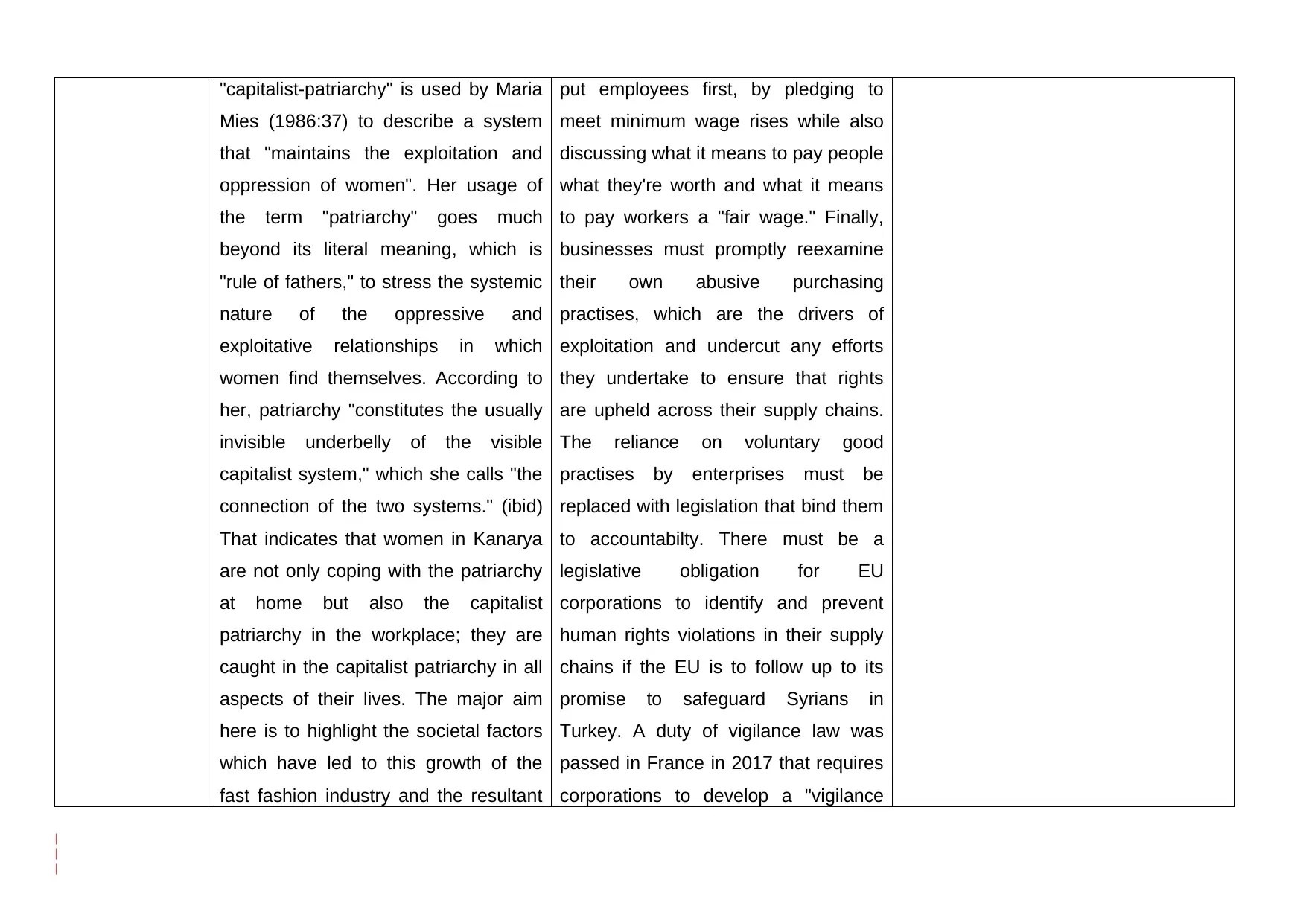
"capitalist-patriarchy" is used by Maria
Mies (1986:37) to describe a system
that "maintains the exploitation and
oppression of women". Her usage of
the term "patriarchy" goes much
beyond its literal meaning, which is
"rule of fathers," to stress the systemic
nature of the oppressive and
exploitative relationships in which
women find themselves. According to
her, patriarchy "constitutes the usually
invisible underbelly of the visible
capitalist system," which she calls "the
connection of the two systems." (ibid)
That indicates that women in Kanarya
are not only coping with the patriarchy
at home but also the capitalist
patriarchy in the workplace; they are
caught in the capitalist patriarchy in all
aspects of their lives. The major aim
here is to highlight the societal factors
which have led to this growth of the
fast fashion industry and the resultant
put employees first, by pledging to
meet minimum wage rises while also
discussing what it means to pay people
what they're worth and what it means
to pay workers a "fair wage." Finally,
businesses must promptly reexamine
their own abusive purchasing
practises, which are the drivers of
exploitation and undercut any efforts
they undertake to ensure that rights
are upheld across their supply chains.
The reliance on voluntary good
practises by enterprises must be
replaced with legislation that bind them
to accountabilty. There must be a
legislative obligation for EU
corporations to identify and prevent
human rights violations in their supply
chains if the EU is to follow up to its
promise to safeguard Syrians in
Turkey. A duty of vigilance law was
passed in France in 2017 that requires
corporations to develop a "vigilance
|
| 11
|
Mies (1986:37) to describe a system
that "maintains the exploitation and
oppression of women". Her usage of
the term "patriarchy" goes much
beyond its literal meaning, which is
"rule of fathers," to stress the systemic
nature of the oppressive and
exploitative relationships in which
women find themselves. According to
her, patriarchy "constitutes the usually
invisible underbelly of the visible
capitalist system," which she calls "the
connection of the two systems." (ibid)
That indicates that women in Kanarya
are not only coping with the patriarchy
at home but also the capitalist
patriarchy in the workplace; they are
caught in the capitalist patriarchy in all
aspects of their lives. The major aim
here is to highlight the societal factors
which have led to this growth of the
fast fashion industry and the resultant
put employees first, by pledging to
meet minimum wage rises while also
discussing what it means to pay people
what they're worth and what it means
to pay workers a "fair wage." Finally,
businesses must promptly reexamine
their own abusive purchasing
practises, which are the drivers of
exploitation and undercut any efforts
they undertake to ensure that rights
are upheld across their supply chains.
The reliance on voluntary good
practises by enterprises must be
replaced with legislation that bind them
to accountabilty. There must be a
legislative obligation for EU
corporations to identify and prevent
human rights violations in their supply
chains if the EU is to follow up to its
promise to safeguard Syrians in
Turkey. A duty of vigilance law was
passed in France in 2017 that requires
corporations to develop a "vigilance
|
| 11
|
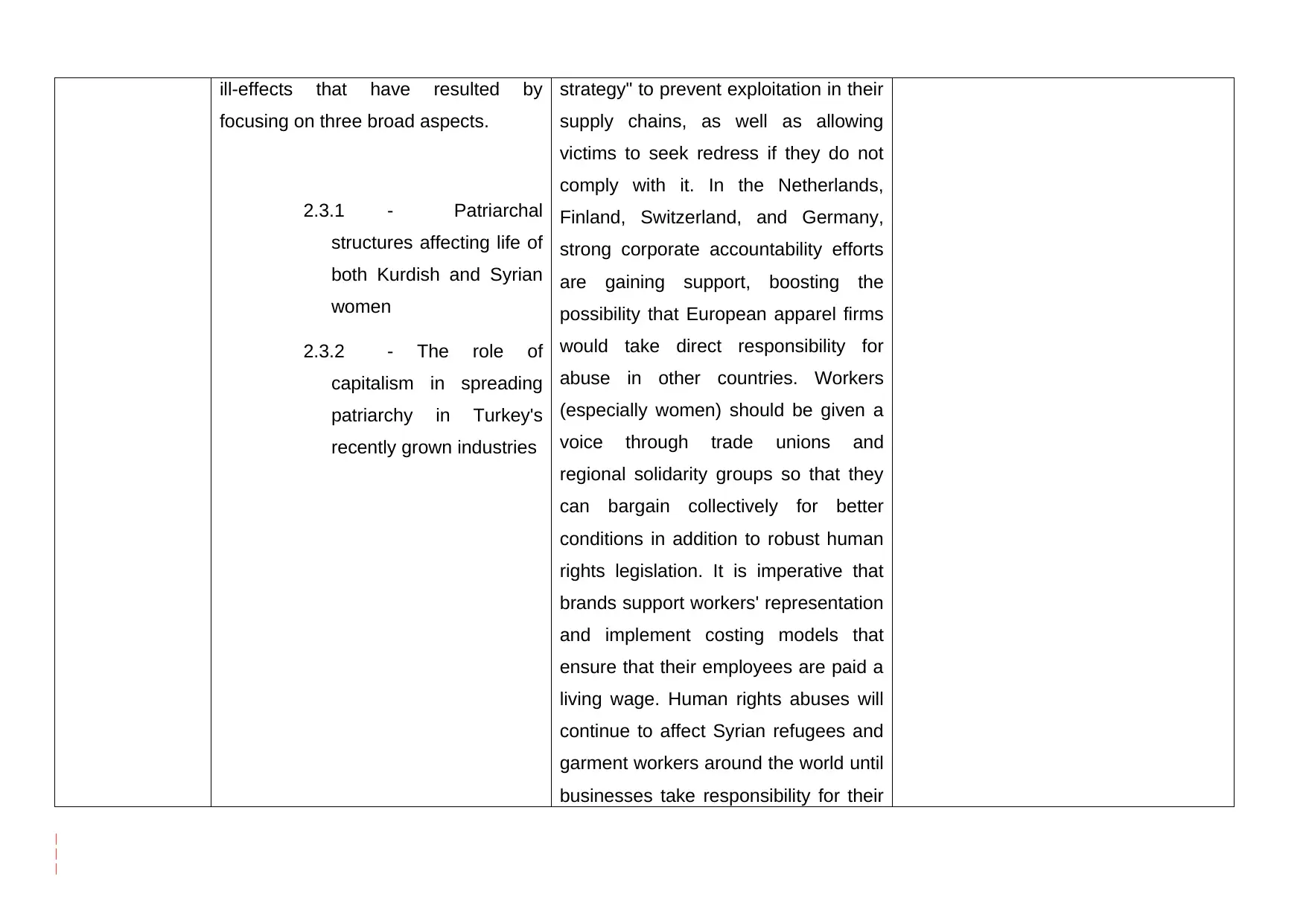
ill-effects that have resulted by
focusing on three broad aspects.
2.3.1 - Patriarchal
structures affecting life of
both Kurdish and Syrian
women
2.3.2 - The role of
capitalism in spreading
patriarchy in Turkey's
recently grown industries
strategy" to prevent exploitation in their
supply chains, as well as allowing
victims to seek redress if they do not
comply with it. In the Netherlands,
Finland, Switzerland, and Germany,
strong corporate accountability efforts
are gaining support, boosting the
possibility that European apparel firms
would take direct responsibility for
abuse in other countries. Workers
(especially women) should be given a
voice through trade unions and
regional solidarity groups so that they
can bargain collectively for better
conditions in addition to robust human
rights legislation. It is imperative that
brands support workers' representation
and implement costing models that
ensure that their employees are paid a
living wage. Human rights abuses will
continue to affect Syrian refugees and
garment workers around the world until
businesses take responsibility for their
|
| 12
|
focusing on three broad aspects.
2.3.1 - Patriarchal
structures affecting life of
both Kurdish and Syrian
women
2.3.2 - The role of
capitalism in spreading
patriarchy in Turkey's
recently grown industries
strategy" to prevent exploitation in their
supply chains, as well as allowing
victims to seek redress if they do not
comply with it. In the Netherlands,
Finland, Switzerland, and Germany,
strong corporate accountability efforts
are gaining support, boosting the
possibility that European apparel firms
would take direct responsibility for
abuse in other countries. Workers
(especially women) should be given a
voice through trade unions and
regional solidarity groups so that they
can bargain collectively for better
conditions in addition to robust human
rights legislation. It is imperative that
brands support workers' representation
and implement costing models that
ensure that their employees are paid a
living wage. Human rights abuses will
continue to affect Syrian refugees and
garment workers around the world until
businesses take responsibility for their
|
| 12
|
⊘ This is a preview!⊘
Do you want full access?
Subscribe today to unlock all pages.

Trusted by 1+ million students worldwide
1 out of 20
Your All-in-One AI-Powered Toolkit for Academic Success.
+13062052269
info@desklib.com
Available 24*7 on WhatsApp / Email
![[object Object]](/_next/static/media/star-bottom.7253800d.svg)
Unlock your academic potential
Copyright © 2020–2026 A2Z Services. All Rights Reserved. Developed and managed by ZUCOL.